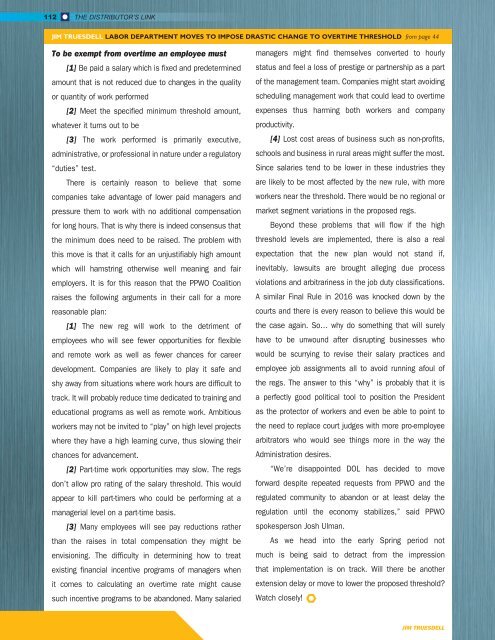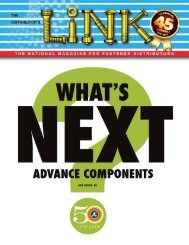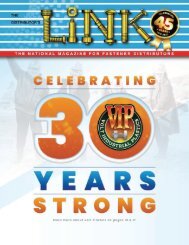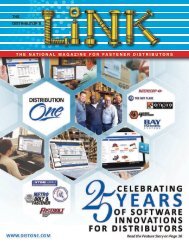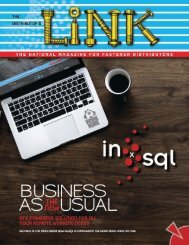SPRING 2024
Distributor's Link Magazine Spring 2024 / Vol 47 No 2
Distributor's Link Magazine Spring 2024 / Vol 47 No 2
Create successful ePaper yourself
Turn your PDF publications into a flip-book with our unique Google optimized e-Paper software.
112<br />
THE DISTRIBUTOR’S LINK<br />
JIM TRUESDELL LABOR DEPARTMENT MOVES TO IMPOSE DRASTIC CHANGE TO OVERTIME THRESHOLD from page 44<br />
To be exempt from overtime an employee must<br />
[1] Be paid a salary which is fixed and predetermined<br />
amount that is not reduced due to changes in the quality<br />
or quantity of work performed<br />
[2] Meet the specified minimum threshold amount,<br />
whatever it turns out to be<br />
[3] The work performed is primarily executive,<br />
administrative, or professional in nature under a regulatory<br />
“duties” test.<br />
There is certainly reason to believe that some<br />
companies take advantage of lower paid managers and<br />
pressure them to work with no additional compensation<br />
for long hours. That is why there is indeed consensus that<br />
the minimum does need to be raised. The problem with<br />
this move is that it calls for an unjustifiably high amount<br />
which will hamstring otherwise well meaning and fair<br />
employers. It is for this reason that the PPWO Coalition<br />
raises the following arguments in their call for a more<br />
reasonable plan:<br />
[1] The new reg will work to the detriment of<br />
employees who will see fewer opportunities for flexible<br />
and remote work as well as fewer chances for career<br />
development. Companies are likely to play it safe and<br />
shy away from situations where work hours are difficult to<br />
track. It will probably reduce time dedicated to training and<br />
educational programs as well as remote work. Ambitious<br />
workers may not be invited to “play” on high level projects<br />
where they have a high learning curve, thus slowing their<br />
chances for advancement.<br />
[2] Part-time work opportunities may slow. The regs<br />
don’t allow pro rating of the salary threshold. This would<br />
appear to kill part-timers who could be performing at a<br />
managerial level on a part-time basis.<br />
[3] Many employees will see pay reductions rather<br />
than the raises in total compensation they might be<br />
envisioning. The difficulty in determining how to treat<br />
existing financial incentive programs of managers when<br />
it comes to calculating an overtime rate might cause<br />
such incentive programs to be abandoned. Many salaried<br />
managers might find themselves converted to hourly<br />
status and feel a loss of prestige or partnership as a part<br />
of the management team. Companies might start avoiding<br />
scheduling management work that could lead to overtime<br />
expenses thus harming both workers and company<br />
productivity.<br />
[4] Lost cost areas of business such as non-profits,<br />
schools and business in rural areas might suffer the most.<br />
Since salaries tend to be lower in these industries they<br />
are likely to be most affected by the new rule, with more<br />
workers near the threshold. There would be no regional or<br />
market segment variations in the proposed regs.<br />
Beyond these problems that will flow if the high<br />
threshold levels are implemented, there is also a real<br />
expectation that the new plan would not stand if,<br />
inevitably, lawsuits are brought alleging due process<br />
violations and arbitrariness in the job duty classifications.<br />
A similar Final Rule in 2016 was knocked down by the<br />
courts and there is every reason to believe this would be<br />
the case again. So… why do something that will surely<br />
have to be unwound after disrupting businesses who<br />
would be scurrying to revise their salary practices and<br />
employee job assignments all to avoid running afoul of<br />
the regs. The answer to this “why” is probably that it is<br />
a perfectly good political tool to position the President<br />
as the protector of workers and even be able to point to<br />
the need to replace court judges with more pro-employee<br />
arbitrators who would see things more in the way the<br />
Administration desires.<br />
“We’re disappointed DOL has decided to move<br />
forward despite repeated requests from PPWO and the<br />
regulated community to abandon or at least delay the<br />
regulation until the economy stabilizes,” said PPWO<br />
spokesperson Josh Ulman.<br />
As we head into the early Spring period not<br />
much is being said to detract from the impression<br />
that implementation is on track. Will there be another<br />
extension delay or move to lower the proposed threshold?<br />
Watch closely!<br />
JIM TRUESDELL


